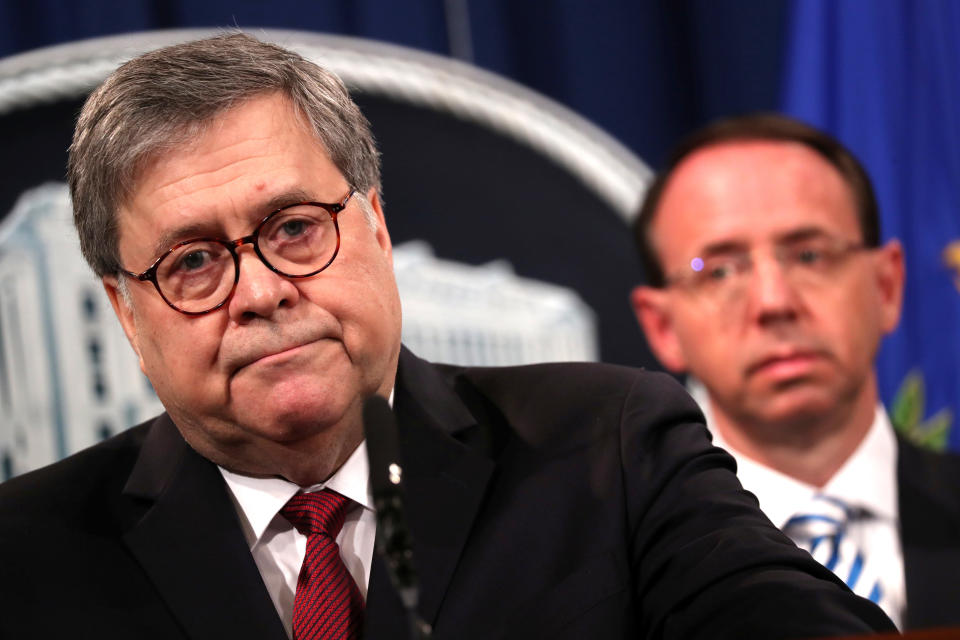Barr cites '10 episodes' in Mueller report detailing possible Trump obstruction
Attorney General William Barr on Thursday held a news conference ahead of his release of a redacted version of special counsel Robert Mueller’s report on the investigation into Russian interference in the 2016 presidential election — and whether President Trump had attempted to interfere in that probe.
Barr began his press conference repeating his public statements about the Mueller report, emphasizing that no evidence was found proving that Trump campaign associates — or any American — conspired with the Russian influence campaign.
For the first time, however, the attorney general noted that the report details "10 episodes” of possible obstruction on the part of the president and discusses potential legal theories for connecting those activities to the elements of an obstruction offense.
Barr said that he and Deputy Attorney General Rod Rosenstein found that the evidence was "not sufficient" for an obstruction offense and that he never spoke to Mueller about his decision not to file criminal charges against the president.
Prior to Thursday’s news conference, the White House counsel was given a copy of the report, but Trump had decided not to invoke executive privilege to redact the document further before its public release, Barr said.
Sounding at times like a defense lawyer for the president, Barr noted that Trump "was frustrated and angered by a sincere belief" that the probe undermined him. Barr also faulted the media for Trump’s impatience, noting the "relentless speculation in the news media about the president's personal culpability."
When asked whether it was proper for the attorney general to be “spinning the report before the public gets a chance to read it,” Barr responded, “No.”
Reporter: "Is it an impropriety for you to come out and sort of, what appears to be, sort of, spinning the report before the public gets a chance to read it?"
Barr says "no," and then the news conference ends. https://t.co/zGVxY5iL8T pic.twitter.com/14QrPYbG7n— Yahoo News (@YahooNews) April 18, 2019
While Barr said he would not object to Mueller testifying before Congress, he also portrayed the special counsel’s report as having been written for him.
“Was [Mueller] invited to join you up on the podium? Why is he not here? This is his report obviously that you're talking about today,” a reporter asked.
"No, it's not. It's a report he did for me, as the attorney general,” Barr replied.
Reporter: "Was [Mueller] invited to join you up on the podium? Why is he not here, this is his report obviously that you're talking about today."
Barr: "No it's not. It's a report he did for me, as the attorney general."https://t.co/zGVxY5iL8T pic.twitter.com/1kgahRMyfE— Yahoo News (@YahooNews) April 18, 2019
At the conclusion of the press conference, Rep. Jerry Nadler, D-N.Y., chair of the House Intelligence Committee, promptly sent a letter to Mueller requesting that he testify.
It is clear Congress and the American people must hear from Special Counsel Robert Mueller in person to better understand his findings. We are now requesting Mueller to appear before @HouseJudiciary as soon as possible. pic.twitter.com/Mmo6PA4KPt
— (((Rep. Nadler))) (@RepJerryNadler) April 18, 2019
On Wednesday evening, Nadler reacted angrily to news that Barr would hold his news conference prior to the public release of Mueller’s report.
“I’m deeply troubled by reports that the White House is being briefed on the Mueller report ahead of its release,” said Nadler.
Barr previously said he would keep portions of the report secret that contained information presented to a grand jury, material that might compromise intelligence officials’ sources and methods, or parts that could hamper ongoing investigations. He also said he would withhold portions of the document that the Justice Department considered damaging to “peripheral third parties.”
Mueller, who was appointed in May 2017, days after Trump fired then-FBI Director James Comey, submitted his nearly 400-page report to Barr on March 22. Barr then released a four-page summary of Mueller’s key findings, which Trump and his supporters said warranted the president’s “complete and total exoneration.”
Members of Mueller’s team were reportedly unhappy with Barr’s summary because they did not believe it accurately depicted the concerns and evidence that the special counsel’s investigation had turned up.
Since the completion of Mueller’s report, Democrats in Congress, who are seeking more information about why Barr did not charge Trump with obstruction of justice, have been calling for its full release.

_____
More coverage of the Mueller report from Yahoo News:
Sarah Sanders invented story about FBI agents’ reaction to Comey firing
Trump sought to obstruct Mueller — but White House aides wouldn’t do it
Mueller report: Trump’s reaction to Russia investigation: 'I'm f***ed'
Trump as Mueller report is released: 'I'm having a good day'
Mueller report: Trump asked aides to help find Clinton's 'missing' emails
Trump celebrates Mueller report with another 'Game of Thrones' meme
In his report, Mueller invites Congress to investigate Trump obstruction


